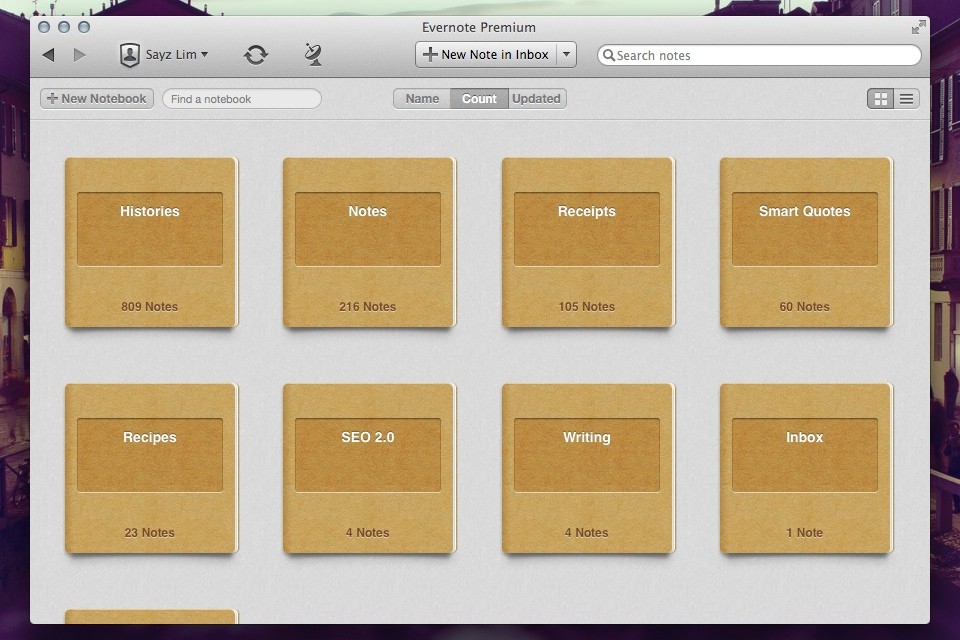What stops you from using Evernote? I didn’t use Evernote until recently. In the past, I sent all my saved articles in Instapaper to Pinboard. That was the only way for me to keep the records of what I’ve read. What about the other things?
At that moment, I realized the importance of keeping records.
Now I keep the records of my articles, photos, receipts, licenses, and locations with Evernote.
When I started to use Evernote, I couldn’t figure out how to organize my notes. What kind of notes should I save? How many notebooks should I create? How to keep everything organized?
It’s easy to mess up your Evernote account1; you definitely don’t want to turn your Evernote into Nevernote. If you’re new to Evernote, here is a few tips to create a timeless Evernote storage.
Make Inbox as your default notebook
You need two notebooks to use Evernote effectively. The first one is Inbox which you use to store all the temporary notes until they’re properly tagged. The point of keeping Inbox is to prevent you from organizing the notes. Focus on creating notes and leave them all in Inbox. Once you get home, you can sort the notes you’ve saved that day.
Save everything in Archives
The second essential notebook is Archives. You can’t use Evernote without this notebook; it’s the key to create a organized Evernote account. This is where you save all the notes you’ve reviewed or tagged from Inbox into Archives.
But, wait. What if I want to create a notebook for… stop.
When you have notebooks called Meeting, PDFs, Audios, you’re going to spend more cognitive resources deciding your notes final location. Your cognitive resource has a limit; don’t spend it to organize your notes. Beside, Evernote has a powerful search feature to help you find your notes.
Avoid creating unnecessary notebooks. When you only have two notebooks, you simply save everything in Archives.
Sometimes to stay organized is to stop organizing.
Use notebooks for projects
You can use notebooks. In fact, notebooks are great for projects.
Last year I wanted to buy myself a fixie. I created a notebook called Fixie for all the resources about fixie. I saved many type of articles like picking a perfect ride, measuring the tension of chain, and learning skid stop. Once I’ve accomplished the project — that’s when I can ride and modify the bike confidently — I can tag all the notes in this notebook with Fixie, move them into Archives, and delete the notebook.
Less notebooks means less clutter. Notice that a project can be unrelated to works. I still have a notebook called Recipes for my project to learn cooking. It’s one of the example where notebooks are useful.
Selectively save your notes
I don’t save everything in Evernote. You want your search to be relevant — so prune your notes. There are few rules for me to decide what notes to save:
- Notes must be useful. It needs to be something you’re searching earnestly online to solve your problems. It can be how to fix a broken faucet, how to slice onion without shedding tears, or how to forgive someone you hate.
- Notes must be important. All legal documents are important: identity card, car license, or passport. You don’t need a fancy scanner to get these into Evernote; use your fancy iPhone.
- Notes must be inspirational. It can be a quote from a book you read. It can be a graffiti you see under the bridge. It can a recording of the conference you attend. Those notes that build up your enthusiasm are worth-saving.
- Notes must be memorable. Save memories in Evernote, or maybe Day One. It’s up to you. Since we’re always using other social networks to create memories, I like to pass all the photos and status updates to Evernote with IFTTT.
Limit your tags
Tags are expensive. It costs your attention, time, and energy — like unnecessary notebooks. Just because the article mentioned WordPress doesn’t mean you should tag it with WordPress. It can be difficult to manage your notes when too many tags exist. Don’t cultivate tags. They’re mostly useless.
You need an unyielding reason to use tags. Done well, tags will become a great tool to find your notes. You can, however, tag by source. The records of my online activities come from several sources: Twitter, Flickr, and Pocket. Tags show me the how active I am on social networks. They also serve as a filter to search by sources.
Another reason to use tags is when creating a new notebook is too much. Instead, use tags as the replacement for notebook. I follow this tips by tagging all my software licenses with License.
I should note that these tips are not rules. You can always modify it to match your habits. It can be daunting to use Evernote in the beginning, but soon you’ll grow a habit to remember everything.
I did once. ↩


